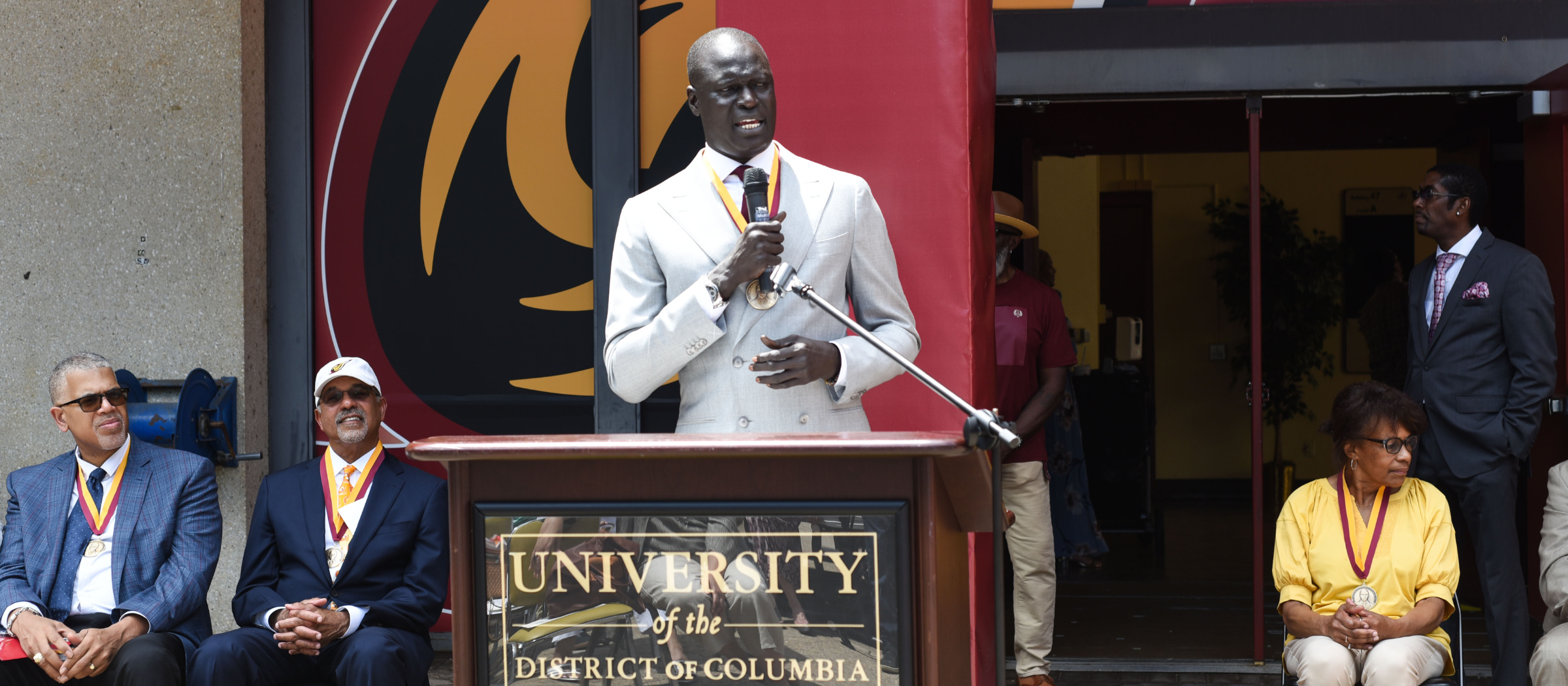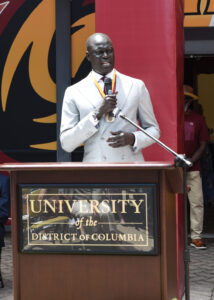
UDC Alumnus and UDC Hall of Famer Spreads the Love of Basketball Throughout Africa
UDC Alumnus and UDC Hall of Famer Spreads the Love of Basketball Throughout Africa

As a Senegal native, Amadou Gallo Fall, a UDC alumnus, UDC Hall of Famer, and currently president of the Basketball Africa League, was recruited to play basketball at the University of District of Columbia after meeting someone from the Peace Corps in the 1980s. He then met legendary UDC basketball coach George Leftwich.
“He met this African kid who was 6’8” and could jump out of the building, and the coach gave me a full scholarship letter without even seeing me play, so for me, that was a catalyst, and that opened my eyes to the power of basketball,” said Fall.
“It has allowed me to go places, meet incredible people, develop a network, and realize that there was something bigger than my success, that we could have an impact, and that’s the journey I’ve been on. Back in those days, I had no idea that it would take me to where I am today, but I’m here today, and I’m here, humbled and honored and just grateful to recognize that it all started from here,” he said.
After graduating Magna Cum Laude from UDC, where he played center on the basketball team, Fall worked for the Dallas Mavericks as director of player personnel and vice president of international affairs. There he served as a global goodwill ambassador, overseeing scouting assignments.
Fall planned to attend medical school because Doctors Without Borders inspired him. However, he realized he was more interested in service than the practice of medicine, which he could do quicker and on a bigger scale with basketball.
He traveled to Africa and was an integral part of Basketball Without Borders, the NBA and FIBA’s global basketball development and community outreach program that uses the game to create positive social change in education, health, and wellness.
Fall was then named vice president & managing director of NBA Africa, where he worked with local federations, corporations, NGOs, and other key stakeholders to grow the game of basketball across the continent.
In this role, he helped open the NBA’s office in Johannesburg in 2010, where he spent the next decade overseeing the league’s grassroots development efforts and partnerships with marketing, media, and consumer products companies in Africa.
Fall was named president of the Basketball Africa League (BAL) and led the historic league’s launch in May 2021, defining its vision and strategy. He oversees the league’s business and basketball operations, leading its efforts to build a comprehensive basketball ecosystem in Africa.
Among his many accomplishments, Fall has received multiple leadership awards for his contributions to the growth of basketball and youth development on the African continent, including New African’s 100 Most Influential Africans (2019), the South African Sport Industry’s Leadership in Sport (2018) and African Leader 4 Change (2017).
He motivates African student-athletes by first making them realize that success is possible.
“Then what we did was rather than just taking one or two people to bring them to the states, ultimately, we wanted to take the model over there in Africa – the whole idea of student-athletes and the values of basketball, how it teaches young people to grow to become better members of communities and better citizens,” he said.
They learn about respect, teamwork, and perseverance.
“That’s the model we took back to Africa, why we created SEED (Sports for Education and Economic Development). It’s really an outgrowth of my story, and it all started here, and the experience that I’ve had,” he said.
Fall founded SEED, a global non-profit organization established in 1998 to use sport to inspire, empower and support the holistic development of promising African youth, preparing them to become global citizens.
Basketball is just the hook, he said. “We’ve had people come through those programs. Some made it to the NBA, played basketball at a high level, but others took it as far as I’ve taken it in terms of getting my college degree and then moving on to other things.”
“We have some young people here in the room who now finished their careers in basketball or college, got their MBAs, and went back starting businesses, so that’s just to show that there’s bigger to this than just playing the game on the court,” said Fall.
He considers his brother to be a role model. He also looked to the examples set by Nelson Mandela and Martin Luther King, Jr., and those who had “an impact on our history in Africa and the diaspora.”
“Of course, John Thompson here at Georgetown was a big part of whatever I could achieve. I was friends with George Leftwich, my coach at UDC, and we have a lot of mentorship from both people,” he said.
Fall attended the unveiling of the statue honoring UDC alumnus Dr. Edwin Bancroft Henderson, “The Grandfather of Black Basketball,” on Saturday, June 24, in front of the Dr. Edwin Bancroft Henderson Sports Complex on UDC’s Van Ness campus.
Fall sees similarities between Henderson’s example and his organization SEED.
“I was reading the story about him and his friends going to YMCA to watch all-white games and getting basically booted out of those gyms, and he decided to start those in the community,” he said.
“It reminded me of one of the great sons of Africa, Fela Kuti when he said that if you feel bad about it, do something about it, and that’s what they did in creating their own basketball programs and today what it represents,” Fall said.
“When you look at the NBA with the percentages of African Americans and from our perspective, the number of players from Africa continuing to increase in the league and today that we have a professional part of the Basketball Africa League, which is the culmination of all the work we’ve been doing on the continent for many, many decades,” he said.